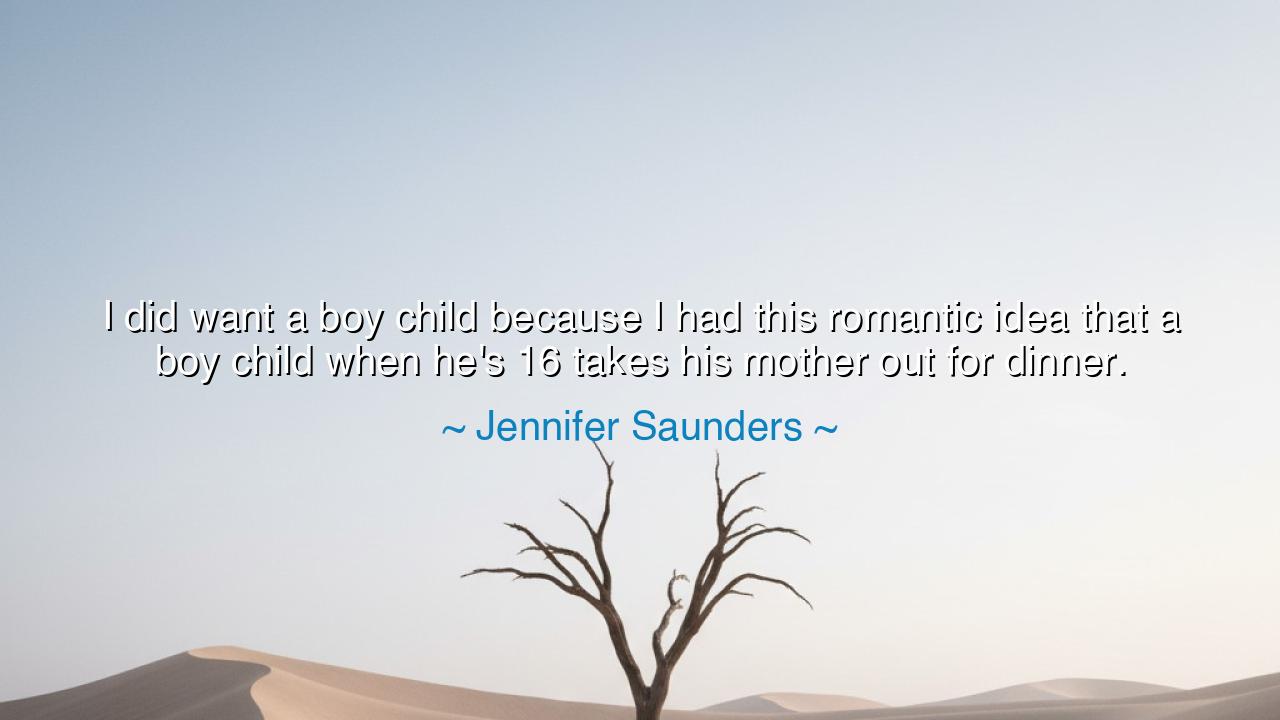
I did want a boy child because I had this romantic idea that a
I did want a boy child because I had this romantic idea that a boy child when he's 16 takes his mother out for dinner.






The words of Jennifer Saunders—“I did want a boy child because I had this romantic idea that a boy child when he’s 16 takes his mother out for dinner.”—are tender, whimsical, and filled with the bittersweet dreams that often accompany the thought of parenthood. In them, she unveils not merely a desire for a son, but the romantic idea of a relationship between mother and child, a vision clothed in simplicity: the boy, grown tall, yet still devoted, guiding his mother to a table and honoring her with an act of love. It is not the dinner itself that matters, but the gesture—the acknowledgment of gratitude, the bond that endures beyond childhood.
To long for such a moment is to reveal the timeless yearning of the human heart: that love given in nurturing shall one day be returned in remembrance. For what is parenthood but a pouring out of self, a sacrifice repeated in silence, with no guarantee of recognition? And yet, the thought of a son who at sixteen takes his mother by the hand and says, “Tonight, I honor you,” is the sweetest of romantic dreams—not of passion, but of reverence, of a child’s love turned back toward the one who first gave life.
This sentiment has deep roots in history. In the ancient East, the virtue of filial piety was held above all others. In China, the stories of sons who honored their parents—such as the boy who fanned away mosquitoes so his father might rest in peace—were treasured and passed down for centuries. In Rome, too, we hear of figures like Aeneas, who carried his father Anchises upon his shoulders through the flames of Troy, showing that even in the midst of destruction, devotion to a parent was a heroic act. These stories remind us that Saunders’s tender wish is part of a long lineage: the dream that children will grow not only strong in body, but strong in gratitude.
Yet there is humor and humility in her confession. Saunders calls it a “romantic idea,” as though she knows it may never unfold exactly so. For life rarely follows the scripts we imagine. The boy may never take his mother to dinner at sixteen, or he may, but in his own awkward way. And herein lies another truth: the romance of parenthood is not in the perfection of imagined gestures, but in the small, imperfect ways love is revealed. A clumsy hug, a hurried word, or even the quiet presence of a child can carry the weight of that dreamed-of dinner.
Still, her words illuminate a lesson for all. In desiring this symbolic act, Saunders reminds us that relationships are sustained not only by sacrifice, but by acts of remembrance. Love must not flow only downward from parent to child, but upward as well, from child to parent, in gestures of gratitude, however small. To give thanks while the giver still walks the earth is itself a holy duty, for once lost, the chance cannot return.
Practically, this calls each of us to action. If you are a child, take time to honor those who raised you—not with grandeur alone, but with sincerity. Share a meal, write a letter, offer a word of thanks. These small acts, though ordinary, are the fulfillment of the romantic idea that Saunders dreamed of. And if you are a parent, cherish the love that comes back to you, even if it does not arrive in the exact form you once imagined.
Thus, the words of Jennifer Saunders are not merely playful musings, but teachings for the generations. They tell us that in the bond between mother and child lies one of the deepest romances of all—not a fleeting passion, but a lifelong devotion, tested by years, crowned by gratitude. Let us therefore live so that love flows both ways: from those who give life to those who receive it, and back again, so that the circle of affection remains unbroken, eternal, and filled with light.






AAdministratorAdministrator
Welcome, honored guests. Please leave a comment, we will respond soon